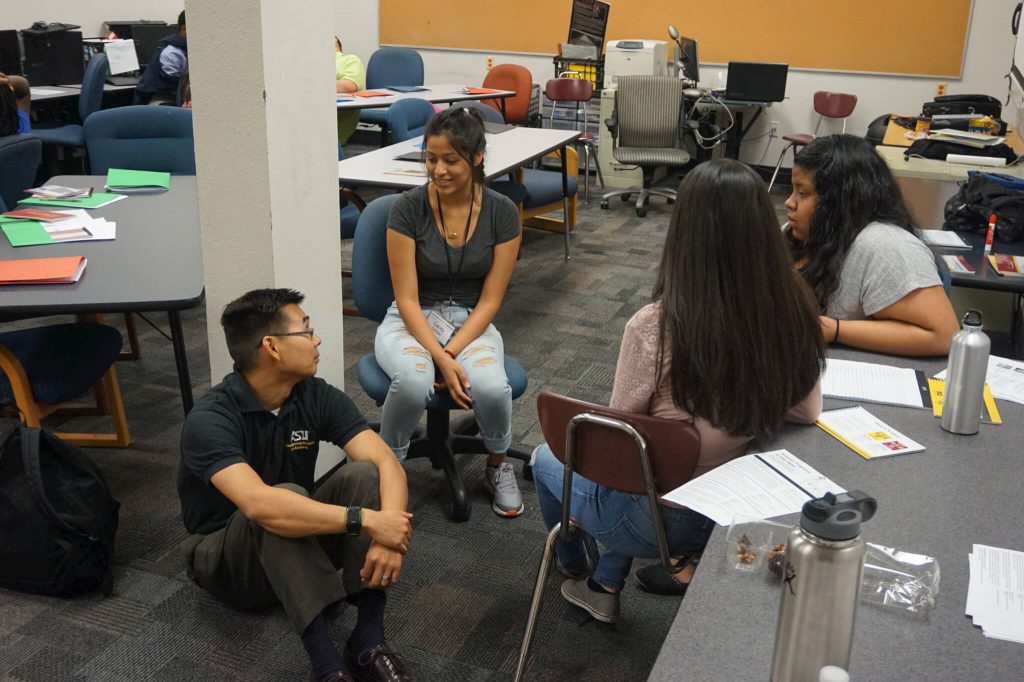How Do I Get My Teen to Talk to Me?
March 25th, 2022
 Getting a teen to talk to you is the same as getting any other person to talk to you. In fact, talking to your kids should be easier than talking to strangers, but it may not always feel that way. Together, we will walk through the basic things you can do to get your teen to open up more, and we’ll explore things that might be making it more difficult (even if you are doing all the right things).
Getting a teen to talk to you is the same as getting any other person to talk to you. In fact, talking to your kids should be easier than talking to strangers, but it may not always feel that way. Together, we will walk through the basic things you can do to get your teen to open up more, and we’ll explore things that might be making it more difficult (even if you are doing all the right things).
Talking is a Skill
Before we jump into all the ways you can nudge your teen into a more communicative relationship, we need to remember that the ability to speak with someone else is a skill. Many times we forget this, as adults, because by the time we have teenage kids, talking to others feels like second nature. It’s easy for us to forget how bad we were at socializing when we first started. When you ask your teens about their day, you might only hear one-word answers—there’s a good chance you responded the same way to your parents. With the COVID 19 pandemic, this has even become harder, as many current teenagers had fewer opportunities to talk with each other. Parents are usually strides ahead of their teens in terms of communication, however, I have also seen many situations where even parents have not quite developed the ability to confidently and efficiently communicate with other people, much less their child. Thus, when determining how to aid your teenager in starting to talk with you, it is important to look beyond just their skill, and evaluate your own as well.
The thing to remember here is, don’t take it personally if your children aren’t talking to you. They might just need time. They might just need more practice. They might want to talk with you, but they just don’t know what to say or how to say it. This isn’t always the case—in some cases it might be a personal issue, but we will get into that.
Motivation to Talk
The first step in getting someone to talk with you is giving them motivation to. If we’re considering your child, they usually have a built-in motivation to talk with you. In many cases, you don’t have to do anything to build that motivation. The issue is that we often unknowingly demotivate our children to talk with us.
I was recently coaching parents and their child on how to talk with each other more effectively. In this situation, the child (we will call them Alex) wanted to talk with their parents. During our first call with Alex and their parents, Alex opened up and shared what has been on their mind. The parents loved it! However, after that call, when the parents found out certain pieces of information about Alex, they turned around and punished them. What happened next was not a surprise—Alex did not want to talk with the parents anymore. I talked with the parents alone and realized that they had no idea what they had done. I had to ask them, “What do you think a child is going to do if they realize that every time they talk with you they risk getting into trouble?” It’s a simple question, but we don’t always realize it. If we punish our kids for talking to us, then they won’t want to talk to us. In fact, not only will they not talk with you anymore, but they will actually try to hide and lie about what they are doing. In this case, I told the parents they needed to show Alex the benefits of talking together. Children are smart, and if they don’t see a benefit in talking, then they won’t think it is worth it. Talking together has to be a win-win situation.
On the other hand, what motivates teens to talk to their parents? A couple of things:
- Children want love, support and protection. When they find out that their parents are offering these three things, it gives them a lot of motivation to build that relationship, open up, and talk.
- Children love someone they can have fun with. Of course, kids don’t want their parents to be the only source of fun, but it is much more of a motivation to spend time and talk with them if they can have fun with their parents.
- Children also love it when someone can help them with something they care about. This is very important to remember. It doesn’t matter if you, as a parent, care about something—if your children don’t care, you are probably wasting your time. You get no credit for doing something for your child that they don’t want done.
Time Solves All Issues
 Once your child has even a little motivation to talk with you and grow the relationship, then it is only a matter of time. And it will take some time, not only the passing of time, but time spent together. Each child is different depending on their age, communication skills, and motivation to talk with you, but usually it will take regular consistent time together to help a teenager open up to you. Since parents have more experience with relationships, this time together will usually have to be initiated by the parent.
Once your child has even a little motivation to talk with you and grow the relationship, then it is only a matter of time. And it will take some time, not only the passing of time, but time spent together. Each child is different depending on their age, communication skills, and motivation to talk with you, but usually it will take regular consistent time together to help a teenager open up to you. Since parents have more experience with relationships, this time together will usually have to be initiated by the parent.
The purpose of spending time with another person is to bring that person into your life and get closer to them. Thus, time will get you more involved in your child’s life. Time will give you knowledge of what the child is going through, what they like, what they do, what they fear, and how they think. Time will make it easier and easier to talk with them.
Here are a few things to remember about time:
- The longer you can keep up spending consistent time with your child, the greater the bond and longer lasting communication you will have with them.
- if you pull back or stop spending this time, it will become more difficult to communicate with the child.
- The more one-on-one attention, the better. Spending time together within a group is good, but people are almost always different when they are alone. One-on-one time allows the child to be themselves and gives them more opportunity to share personal things they may not want to talk about in front of others.
Opportunity is Required
As your teen is motivated, is given the time, and is provided one-on-one attention, it is guaranteed that your child will want to talk with you more. In fact, when you get to this point, you are at the last step in really getting your child to talk with you. This last step focuses on a key part of our original question. How do I get my teen to talk with me? And not how do I talk to my teen? The last step is getting your child to initiate the conversation with you.
In order to ensure your child talks with you, they will need an opportunity to do so. You have to be available enough that your child can know when to initiate a conversation and how to get your undivided attention. Whether this is them having access to your schedule and knowing where you will be, knowing there is a certain time everyday set aside for them, or you having an activity planned each week—they need to know they will have the opportunity to talk with you.
Not only do they need to know when they can have time to talk and initiate a conversation, but also it is important to remember that when you are talking with them, they need time in the conversation that they can initiate things to talk about. Sometimes, as adults, we get uncomfortable with silence, but it is important to remember that children need time to process things and are slower at piecing their thoughts together. Thus, when talking to teens, you need to be comfortable with waiting for them to talk and give them plenty of opportunity to steer the conversation.
Conclusion
Getting your child to talk with you isn’t magic, but it isn’t very complicated. The steps are simple, but it does take a commitment. To recap it takes the following 4 things:
- Give the child motivation to talk with you.
- Spend regular, consistent, and individualized time with them.
- Provide plenty of opportunities for them to initiate conversations.
- Practice being patient. Talking is an ever-growing skill for you and your children.
I always tell parents that nothing is more important to their child’s success than having a good relationship with their parents. Being able to talk with your child and your child wanting to talk with you, is more important than how many college credits they graduate high school with, what their grades are, their extracurricular activities, and especially what college they go to. Don’t let any of these things become reasons for your child to not want to talk with you.
About the Author
Read more about Dr. Jacob’s latest book.
Dr. Jacob Kashiwagi is business management consultant and acting Chairman of the Board for Leadership Society of Arizona. Dr. Jacob has worked on 1,100+ industry projects valued at $3.6 billion with a 95% success rate. He has taught over 1,300 college students and 2,500 high school students.

